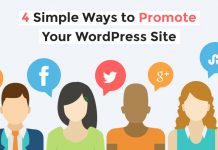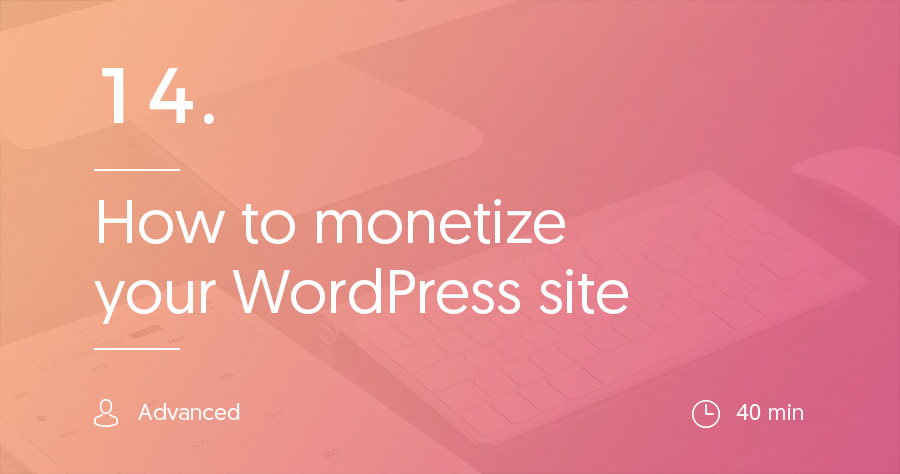So far, we’ve taken you through every aspect of your WordPress site. From choosing a domain and hosting, to installing WordPress, to writing your first post and ranking it in the search engines.
Now, we’re going to get into the topic most people love:
Monetizing your WordPress site.
See, as enjoyable as it can be to launch your own WordPress site, we’re sure that most of you hope to, or at least wouldn’t be unhappy to, earn some money from your site.
And the great thing about websites is that there a million and one ways you can monetize your site. But before we tell you all about the most popular methods of earning money from a website, we want to begin with the elephant in the room…
When Is the Right Time to Monetize Your WordPress Site?
When to start monetizing your site is a surprisingly controversial issue. On one side, some people say to start monetizing from day one. On the other side of the issue, you have some people telling you to wait months before you try to get any money from your site.
And as you might expect, the real answer lies somewhere in the middle.
Determining when to monetize your WordPress site boils down to two core issues:
- Potentially annoying your visitors.
- Making sure you get approved to the monetization methods you choose (more on that later).
With regards to the first issue, we don’t think it’s a real concern. Look at it this way:
If you think your readers will be annoyed if you start advertising on day one, won’t they be just as annoyed if you wait until day 60? The only thing you’re accomplishing is delaying when they get annoyed…and not making any money while you do that.
So, you shouldn’t really worry on that front.
But the second point does hold some legitimacy. See, some monetization methods have programs which like to see a track record of traffic and quality content before they accept a site.
So if you try to apply to these programs as soon as you launch your site, you might get rejected because you’re brand new, when you would have been accepted if you waited a few months. Such rejections are rarely permanent, but it is a waste of time to try to apply to those programs before your site builds up a history.
Overall, don’t be afraid to monetize right away, but do make sure to read the agreements for all of your monetization programs so you don’t waste time applying to programs that reject new sites.
How to Monetize Your WordPress Website
As we said at the beginning, there are a million and one ways to monetize a WordPress site. So we’re not going to claim this guide covers every single method of monetizing a website.
Instead, we’re going to focus on the most popular methods available to website owners. These methods are popular for a reason. That is, they work. But you should always feel free to try a new creative monetization method that’s not on this list.
For each method, we’ll give a brief explanation of how it works, as well as some popular websites to help implement the method (if applicable).
Affiliate Marketing
Affiliate marketing powers a huge percentage of marketing on the Internet. But most people unfamiliar with digital marketing have no idea that it exists.
The concept behind affiliate marketing is fairly simple:
You sign up to your chosen product’s affiliate marketing program. Once accepted, you write about the product and link to it using a unique link (known as your affiliate link). If someone uses that link to go to the product’s website and purchases the product, you get some money from that sale (either a percentage or a flat-rate).
An example of one of the most popular affiliate programs out there is Amazon Associates, which pays out a small percentage of any sale you refer to Amazon.
As we said, much of the web is powered by affiliate marketing. That’s why it can be so hard to, for example, get honest reviews about web hosts. It’s also why we strived to be objective in all the reviews published in our Hosting Finder.
There are two main ways to find affiliate programs:
- Sign up at an affiliate network (basically a collection of hundreds of different affiliate programs).
- Find a product you like and see if it offers an affiliate program. Most products with affiliate programs include a link in their website’s footer.
Some popular affiliate networks are:
If you do engage in affiliate marketing, make sure you read about FTC disclosure requirements to stay on the good side of the law (and most affiliate agreements).
Third-Party PPC Networks Like AdSense
We know you’ve seen Google AdSense ads around the web, whether or not you knew them by that name at the time.
With AdSense and other similar ad networks, you insert a piece of code into your website. Then, AdSense uses that code to generate two types of ads:
- Ads related to the specific content on your page.
- Ads related to each individual visitor’s browser history, AKA retargeting. You can turn these off if you want.
Then, you get paid both when the ad is displayed, as well as when a visitor clicks on the ad.
AdSense is a good option because it’s so easy to implement. You literally add the code and forget about it. AdSense does all of the work for you and just cuts you a check.
But, as a result, it often doesn’t pay as much as you can earn with other monetization methods.
Unless you have very general traffic (for example, a news blog), you’re usually better off trying some of the other monetization methods first, as you’ll likely make more money.
Sell Ads Directly
Like AdSense, you’re displaying banner ads with this method. But instead of relying on AdSense to find and display the ads, you’ll have to find the ads yourself.
The pros of this method are that:
- You can potentially earn more money.
- You have full control over every single ad displayed on your site.
But the con is that you have to put in the legwork to actually find willing advertisers.
To help manage your ad sales, you can either use a third-party service like Buy Sell Ads, or use a free plugin like AdRotate.
Sell Sponsored Posts or Reviews
Sponsored posts or reviews are a simple concept. Someone approaches you with a post topic or a product to review. You write the post. And you get paid!
Easy, right? Once you start getting some traffic, you’ll have plenty of people approaching you with such opportunities.
The tricky part is maintaining your integrity. You don’t want your readers to feel like your opinion is being swayed by money. Additionally, in some jurisdictions, you legally have to disclose if anyone paid you for the post.
So while this certainly is a viable way to make money, we want to stress that you should always be completely honest and above board about which pieces of content are sponsored.
Create a Membership Site and Charge for Access
Membership sites are a bit more advanced as far as monetization methods go. Basically, you create a site with some private areas. Then, you charge people for access to those areas.
It’s a fairly common method of monetizing a site nowadays, but it requires a ton of upfront effort to create enough content that people are willing to open up their wallets to get access to it.
If you do decide to go the membership site route, there are a number of plugins which can help you with all of the features you’ll need to create a successful membership site. Some of our favorites are:
Sell Your Own Digital Product
If you don’t want to create a full-fledged membership site, a good option is to try your hand at creating a single digital product to sell. For example, instead of a whole membership area, you could write a single eBook that you sell to your visitors.
To generate sales, it helps to have built up an interested audience first. And you’ll definitely need to promote your book hard – it’s not like you can just throw up an eBook and start raking in the dough.
But plenty of websites make good money selling digital products on a one-off basis.
If you do want to go the digital product route, a plugin like Easy Digital Downloads can help you manage your sales.
Create an Accompanying eCommerce Store
This one is time-consuming and not for the faint of heart. But depending on your site’s niche, you might be able to add an eCommerce store and sell your own physical products.
With a plugin like WooCommerce, you can easily create an eCommerce store using your existing WordPress site.
Just be aware that, in order to make anything approaching serious money, you’ll need to put in a ton of sweat and tears.
And with that, we’ve wrapped up our guide to getting started with WordPress. And while this guide might be finished, we’re nowhere near finished sharing helpful tips.
You can always find new content on our blog. And don’t forget about our Hosting Finder and Theme Finder tools for objective testing data and reviews.













